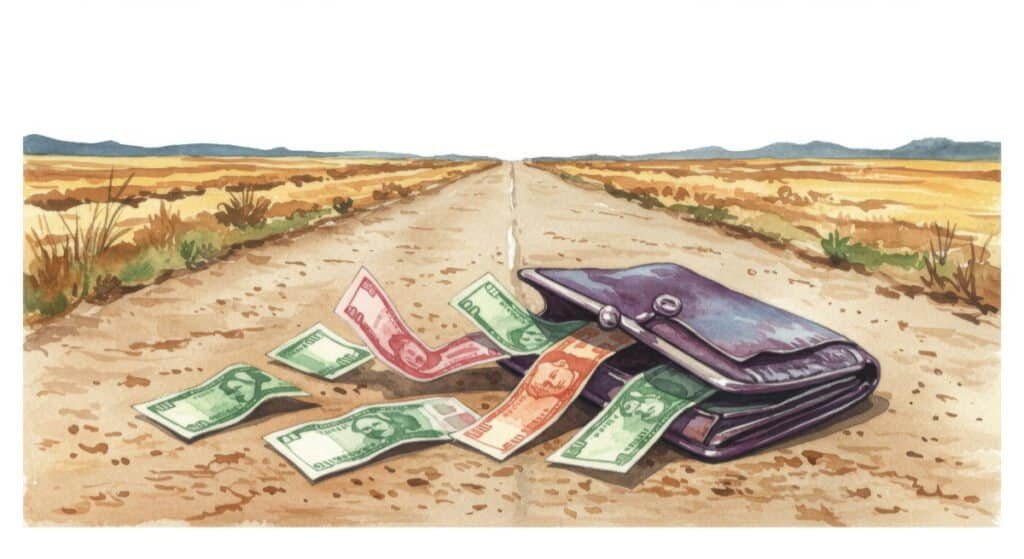When Comfort Becomes a Cage
There’s a question that’s been haunting me lately, one that might be haunting you too: Am I too comfortable?
Not comfortable in the sense of having everything I want, but comfortable in the sense of avoiding everything I should do. Comfortable staying where it’s easy rather than going where I’m called. Comfortable serving others in ways that don’t challenge me rather than facing the harder service that might.
Sometimes God makes our comfort zones uncomfortable for a reason.
Table of Contents
The Geography of Avoidance
For twenty years, I’ve built a life in Japan. Teaching English, farming, and finding contentment in a simple life. On the surface, it looks like I’m serving others, working in small teams, helping students communicate, farming, and writing honestly about midlife challenges for men in my spare time.
But lately, I wonder if my comfort here now is actually avoidance in disguise.
My 85-year-old father lives alone in the UK while my mother sits in a care home, lost to dementia. Every video call reveals the effects of time and carrying responsibilities alone. My spiritual pull toward family responsibility grows stronger, yet I remain where life is familiar, predictable, and safe here in Japan.

Maybe the uninvited discomforts in my life; my partner leaving last year, enduring the daily grind with less ambition as a solo old dog, surviving the Japan summer heat with no air conditioning at home, some financial stress, and the guilt of my geographical distance from where I might be needed, are God’s way of making my overall comfort zone uncomfortable, pushing me toward a harder path I’m avoiding.
Is your comfort zone actually an avoidance zone?
The Selfishness Disguised as Service
Here’s the truth if I’m honest: part of me wants to stay carefree, feel young regardless of my aging exterior, and enjoy this simple life without the complications of caregiving or family drama.
There’s an honest but selfish me who likes his independence, his routines, his quality time with freedom to write at 4 AM or cycle to work in the rain without considering anyone else’s needs.
Then there’s the guy who worries about failing God. The Bible talks about honoring our parents:
“Honor your father and your mother, so that you may live long in the land the Lord your God is giving you.” – Exodus 20:12
Am I supposed to stop serving people in Japan to start serving my family in the UK? Or is my reluctance to leave evidence that I’ve mistaken comfort for calling?
The tension is spiritual: when does serving others become a comfortable way to avoid serving the ones closest to home?
Have you ever used “serving others” to avoid serving the people who need you most?
When Service Becomes Our Safety Net
It’s easier to help students with English lessons than navigate family caregiving. Teaching feels meaningful, but it’s also manageable with clear boundaries, scheduled hours, and predictable challenges.

Caring for an aging parent? That’s messy, open-ended, emotionally draining, and geographically inconvenient. It would mean leaving the life I’ve built, starting over financially at 57, facing family dynamics I’ve successfully avoided for two decades.
But maybe that’s exactly why it might be what I’m called to do.
Sometimes we choose the service that feels good over the service that costs us something. We pick the ministry that fits our comfort zone rather than the one that requires sacrifice.
The question becomes: Are we serving others, or are we serving ourselves by serving others in ways that don’t threaten our comfort?
What service are you avoiding because it would cost you too much?
When Comfort Becomes Uncomfortable
Living with unresolved spiritual tension is exhausting. The constant low-level anxiety about whether you’re in the right place, doing the right thing, or following the right calling.
Financial pressure that won’t relent. Geographical distance that creates guilt. The nagging sense that comfort has become a form of spiritual procrastination.
Maybe that’s the point. Maybe God allows the tension to build until staying comfortable becomes more painful than making the difficult change.
When our current situation creates more spiritual unrest than peace, it might be time to consider that we’ve outgrown our comfort zone, or that our comfort zone was never meant to be permanent.
When does spiritual tension become a call to action rather than something to endure?
The Fear Behind the Comfort
The deeper issue isn’t just geographic or financial, it’s also the illusion of fear. Fear that leaving Japan would be as questionable as leaving America was years ago. Fear that I’ll make another major life decision based on obligation rather than authentic calling.

Fear that I’m not strong enough, resourceful enough, faithful enough to handle the challenges that come with uprooting everything for family responsibility.
But maybe that fear is evidence that this decision would require faith, and dependence on God rather than self-reliance. Maybe the difficulty is the point.
Comfort rarely requires faith. Challenge often does.
The Cost of Staying vs. The Cost of Going
Every choice has a price. Staying in Japan means watching my father age from a distance, potentially missing his final years, carrying the weight of geographic guilt. It means modest financial security but spiritual unrest.
Leaving means starting over at 57 with no savings, facing family situations I’ve comfortably avoided, giving up the life I’ve built here. It means financial uncertainty but potential spiritual alignment.
Don’t get me wrong: It could be good. Maybe, my current comfort zone is preventing growth and a better path? But, I’d be saying goodbye to a lot of people.

Both paths involve sacrifice. The question is which sacrifice serves God’s purposes rather than my preferences.
Sometimes the path that costs us everything we’ve built is the one that builds us into who we’re meant to become.
Are you calculating the cost of obedience or the cost of avoidance?
When God Makes Comfort Uncomfortable
Maybe the increasing discomfort in my current situation isn’t something to solve but something to listen to. The financial pressure, the family guilt, and the spiritual tension; What if these aren’t problems to fix but signals to follow?
When comfort zones become uncomfortable, it might be God’s way of preparing us for transition. The restlessness, the questions, the sense that something needs to change could be invitations rather than irritations.
In my case, the goal isn’t to find a more comfortable comfort zone. The goal is to find where God wants me, whether that’s comfortable or not, and where life gives me a sense of purpose.
What discomfort in your life might actually be God’s invitation to move?
The Universal Question
This isn’t just about my geographical dilemma or family situation. This is also about the universal human tendency to mistake comfort for calling, and to choose the easy service over the costly obedience.

We all have areas where we’ve gotten too comfortable. Places where we serve others in ways that don’t threaten our security. Relationships we maintain because they’re easy rather than meaningful. And callings we avoid because they would cost us something precious.
The question “Are you too comfortable?” cuts through all the spiritual language and forces honesty: Are you where you are because God called you there, or because it’s easier than going where He’s actually calling you?
Where have you chosen comfort over calling in your own life?
Closing Thoughts So Far
I don’t have all of the answers about my specific situation yet. But I’m learning to wait for more signs instead of trying to resolve it quickly. To pray about it instead of just analyzing it. To ask God what He wants rather than what I prefer.
Maybe that’s where transformation begins. Not in having clarity about the right choice, but in being willing to make uncomfortable choices if they align with God’s purposes and what feels right in your heart.
You might not be so spiritually inclined, and that’s OK.
Maybe comfort isn’t the enemy, but comfortable avoidance of what we’re called to do is.
Of course, I talk to my father and sister to keep up to date on events and their opinions, ideas, or requests.
The question “Are you too comfortable?”, isn’t meant to create guilt but to create space for honest evaluation. To invite us to consider whether our current comfort is serving a higher purpose or our own.
Are you too comfortable?

Why not leave a comment?. I respond to every one, and your experience could help someone.





